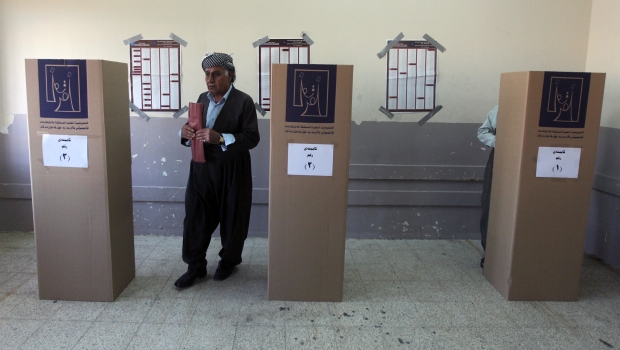
An Iraqi Kurdish man leaves a voting booth before casting his ballot during the Kurdistan’s legislative election at a polling station on September 21, 2013 in the northern Kurdish city of Arbil. (AFP/ PHOTO/AHMAD AL-RUBAYE)
While the KDP leader Massoud Barzani banned party members from making comment on the election results, a leading figure of the party, speaking on condition of anonymity, told Asharq Al-Awsat that “the political bureau of the KDP is busy holding extensive meetings to consider the situation and plan the shape of the next Kurdish government.”
He added that “the Patriotic Union of Kurdistan, led by Iraqi President Jalal Talabani, will be part of the government, as well as the opposition Gorran (Movement for Change), led by Nawshirwan Mustafa.”
He also added that “the position of Gorran would be embarrassing if they did not participate in the next government after winning strong support from their voters, which took them to second place according to the number of seats won (22 seats according to initial results). The movement cannot stay in opposition, away from the political decision-making positions.”
The KDP official said “it is certain that our party will form the government after forming a coalition with its strategic ally the PUK, and once the rest of the minorities join this coalition.” He added that “we are sorry about the PUK’s result (18 seats according to initial results) because it is a party with tradition and which fought alongside the ‘parent party’ (KDP) for the freedom and rights of our people, and we think that Mam Jalal’s absence for treatment abroad and the management of the election campaign have greatly affected the results of our allies in the PUK.”
Meanwhile, supporters of the KDP in Erbil expressed comfort at their party’s position despite being entirely happy with the results. Bakr Mohamed, a 26-year-old Kurdish man, told Asharq Al-Awsat that “I, my family and my friends, have voted for ‘the old party’, ‘the great party’, ‘the party’, which has given a lot to the Kurdish people, but we do not know why we did not win a large majority which allowed our party to form the government.” He added that “we hope that Nechervan Barzani forms the next government because he has achieved so much in building a stable and prosperous economy and security, and we hope our party’s allies do not stand as obstacles to Barzani’s projects.”
Sheler Tawfiq, a 32-year-old woman who works for a private company and who also supports the KDP, said “I lived in London before returning to Erbil with my family. In the UK, we know that that the opposition works with the government for the development of the country and in the interests of the people, but here, the opposition aims to hinder the progress of the government and disrupt its development programs.”
She expressed her hope for the “opposition to learn a lesson in how to provide a service to the region and its people, and to identify the government’s errors and help it overcome them.” She added that “it is a good sign for an opposition to be present to monitor the government’s performance, and this is democracy. But if everyone was in the government, who would identify its mistakes?”
Nawzad Khalil, 27 year-old graduate from Salaheddine University in Erbil, who supports the Movement for Change, said “these results are false and I think our movement, Gorran (Movement for Change), won more seats. We hoped the movement would form the government to achieve a development program which ends administrative and financial corruption.”
Khalil added that that “the Movement for Change attracted the youth and people who wanted to change the situation in the region because we are fed up with the KDP and PUK being the parties in power while we’re in opposition.”
PUK supporters meanwhile, showed dismay and found it difficult to absorb their massive election defeat. Azad Mohamed, a 37 year-old elementary school teacher in Erbil said “I cannot believe what has become of our great fighting party.”
